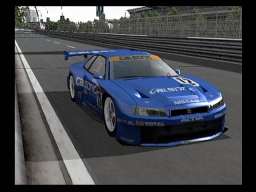
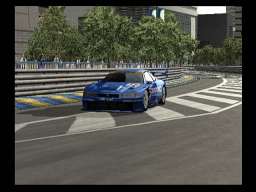
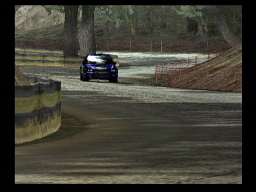
Namco's driving franchise takes a detour with
R: Racing Evolution. This installment takes the traditionally arcade-oriented
Ridge Racer series to a new level of realism. To start, there's a new racing
life mode that puts you in the shoes of a female driver. Add real-world cars,
tracks and handling, and R: Racing Evolution's simulation aspect make it more
like Gran Turismo than the classic arcade play of previous games. This new
approach has been controversial, but do these changes make sense, or has Namco
gone in entirely the wrong direction? We take a spin and find out whether this
new direction is move forward or a step back.
While there are some superficial similarities
to the Ridge Racer series, Namco's R: Racing Evolution isn't an arcade racer.
There's a lot more depth and realism in this title, so its fairer to compare the
game to simulation racing titles like Gran Turismo, which is much closer to what
the developers were aiming for. R: Racing Evolution eschews many of the fantasy
elements in favor of real cars and driving locations. The driving is much more
realistic as well, so the wild drifting action of the previous games has been
replaced by subtler controls that require more sophisticated racing techniques
and deeper strategies. In effect, this is an almost entirely different game in
approach and implementation. Fans of the previous games will immediately notice
that a realistic approach that extends to all aspects of the gameplay, with more
customization options, improved opponent AI, and much harder course designs that
emphasize technical skill. Unlike the fantasy designs in previous Ridge Racer
games, the cars in the game are all real-world models. There are 32 different
licensed vehicles in the game with well-known manufacturers like Ford, Honda,
Acura, Chrysler, Toyota, Mitsubishi included as well as boutique shops like De
Tomaso, Enkai, Bentley, and Lotus providing vehicles as well. Even the parts are
authentic, so you can equip your car with tires from Firestone and Dunlop, or
tune your car using Mac Tools. There are several different vehicle classes in
the game from Racers, to Rally and concept sports cars, each looks and handles
as their real-world counterpart would. As the game begins, you can select from a
limited number of vehicles in each class, more cars become available as you
progress through the game and unlock them.
Additionally, you can tune and tweak your cars
before each race by adjusting a number of vehicle settings. You can change the
shock compression, front and rear springs, drive ratio (acceleration and top
speed), steering responsiveness tight or loose, brakes, torque, and can change
the car's overall weight. The added customization options allow you to maximize
your vehicle's performance on the track. R: Racing Evolution's extensive options
give the game much more depth than you'd expect from a Namco racer. Adding to
the game's realism, most of the 14 tracks are based on real-world locations with
famous courses such as Motegi, Suzuka and Yokohama in Japan, and Monaco's famous
street race making appearances. In addition to these paved courses, players will
face a few off-road rally tracks and even some drag racing strips. Oddly, the
Rally courses are all fantasy, while the traditional racing courses are all
real-world locations. There's definitely more varied types of racing and driving
styles in the game, which adds to its challenge and depth.
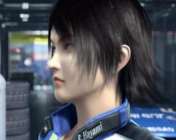 Even
though a great deal of effort has gone into making a more realistic approach,
some elements of fantasy remain. This is due in large part to the Racing Life
mode, where you take the role of a young woman named Rena Hayami who's beginning
her racing career. In this mode, you start with a few training levels. When you
train, you learn the basic techniques and have to complete a variety of
challenges, such as overtaking a rival or beating a set lap time. Once you have
completed these training modes, you can then compete in real races against
rivals. This isn't as easy as it sounds, especially later on when the challenges
become harder and opponents become more aggressive. During the Racing Life Mode,
you'll be able to meet other riders, form friendships or develop rivalries. Your
main opponent is another female racer named Gina Cavalli who dislikes Rena the
moment she lays eyes on her. This creates an interesting plot line here that
unfolds between races and even on the track itself. During the races, your coach
and racing crew will interact with you on the radio and give you information and
encouragement. These communications will also give you hints as you drive.
However, rival drivers can talk to you and taunt you during the race. One
interesting feature in R: Racing Evolution is the Pressure Meter that appears
above the other racers. As you close in on a rival driver, their Pressure Meter
fills up, and starts flashing, which makes them more likely to make mistakes.
Once this happens, it means you should be ready to take advantage and pull
ahead. This innovative feature adds to the tension of each race, helping you
feel more directly involved in the action. In addition to the Racing Life,
several traditional modes are included such as an Event Challenge, where you can
race a single event and Time Attack, where you have to race against the clock.
There is also a traditional Arcade-style mode if you want to get right into the
action and a Versus mode where you can challenge another player head-to-head.
Sadly, the game only supports split-screen mode, and the game lacks online
support, which is highly disappointing.
Even
though a great deal of effort has gone into making a more realistic approach,
some elements of fantasy remain. This is due in large part to the Racing Life
mode, where you take the role of a young woman named Rena Hayami who's beginning
her racing career. In this mode, you start with a few training levels. When you
train, you learn the basic techniques and have to complete a variety of
challenges, such as overtaking a rival or beating a set lap time. Once you have
completed these training modes, you can then compete in real races against
rivals. This isn't as easy as it sounds, especially later on when the challenges
become harder and opponents become more aggressive. During the Racing Life Mode,
you'll be able to meet other riders, form friendships or develop rivalries. Your
main opponent is another female racer named Gina Cavalli who dislikes Rena the
moment she lays eyes on her. This creates an interesting plot line here that
unfolds between races and even on the track itself. During the races, your coach
and racing crew will interact with you on the radio and give you information and
encouragement. These communications will also give you hints as you drive.
However, rival drivers can talk to you and taunt you during the race. One
interesting feature in R: Racing Evolution is the Pressure Meter that appears
above the other racers. As you close in on a rival driver, their Pressure Meter
fills up, and starts flashing, which makes them more likely to make mistakes.
Once this happens, it means you should be ready to take advantage and pull
ahead. This innovative feature adds to the tension of each race, helping you
feel more directly involved in the action. In addition to the Racing Life,
several traditional modes are included such as an Event Challenge, where you can
race a single event and Time Attack, where you have to race against the clock.
There is also a traditional Arcade-style mode if you want to get right into the
action and a Versus mode where you can challenge another player head-to-head.
Sadly, the game only supports split-screen mode, and the game lacks online
support, which is highly disappointing.
 Once
you've selected the game mode, it's time to hit the track, where you'll find
that the vehicles' controls are fairly decent, but vary widely depending on car
model and tuning options. While you can get some decent performance upgrades by
driving additional vehicles or tuning, the cars feel a little bit touchy no
matter which mode you're in. The Rally vehicles in particular seem to suffer
from over-responsive controls, which gives the driving unneeded difficulty.
Before each race, you can also turn the Driving and Steering Assist mode on or
off, which is helpful for beginning racers, but seems constraining once you gain
some experience. The cars don't respond as smoothly as you'd expect them which
makes for a jerky ride. Vehicle responsiveness is a little bit sluggish, which
makes turning and drifting a lot more difficult than it should be, The control
problems are a major letdown, and the game doesn't approach the smoothness seen
in other PS2 racers, making for a somewhat frustrating and ultimately
unsatisfying experience from this standpoint.
Once
you've selected the game mode, it's time to hit the track, where you'll find
that the vehicles' controls are fairly decent, but vary widely depending on car
model and tuning options. While you can get some decent performance upgrades by
driving additional vehicles or tuning, the cars feel a little bit touchy no
matter which mode you're in. The Rally vehicles in particular seem to suffer
from over-responsive controls, which gives the driving unneeded difficulty.
Before each race, you can also turn the Driving and Steering Assist mode on or
off, which is helpful for beginning racers, but seems constraining once you gain
some experience. The cars don't respond as smoothly as you'd expect them which
makes for a jerky ride. Vehicle responsiveness is a little bit sluggish, which
makes turning and drifting a lot more difficult than it should be, The control
problems are a major letdown, and the game doesn't approach the smoothness seen
in other PS2 racers, making for a somewhat frustrating and ultimately
unsatisfying experience from this standpoint.
From a visual standpoint, Namco has done only
an adequate job with the graphics. The engine suffers from excessive jaggies
that make for an ugly experience, which is especially disappointing at this
point in the console's lifespan since most games have fixed these problems long
ago. The courses look decent with some good light sourcing and detailed
side-objects, with some nicely rendered off-road tracks that display an
impressive level of detail. While the use of licensed vehicles is impressive,
the car models suffer from a lack of detail and don't have the polish seen in
many other PS2 titles. The frame-rate is decent, but the game struggles to match
the sense of speed seen in earlier Ridge Racer titles, making the experience
feel sluggish and uninspired. The dance-music soundtrack is decent, but becomes
distracting after awhile, but you can turn this off. Unfortunately, the
voice-over acting is annoying and only serves to get on your nerves, especially
your coach who repeats the same repetitive phrases ad nauseum. With so many
technical problems evident in technical department, R: Racing Evolution
disappoints. It's visuals seem flat, uninspired and surprisingly grainy, with an
overall aesthetic quality that falls below the standards set by current PS2
titles
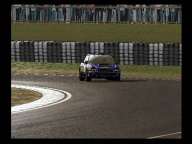 R:
Racing Evolution has it share of good ideas such as the Racing Life mode and the
Pressure Indicator which are innovative. The added customization, real-world
vehicles and tracks are another plus, but the tradeoff means the arcade-style
feel of the previous games is gone. The game also suffers from numerous
technical flaws like poor graphics and erratic controls that detract from the
experience. It's definitely a mixed bag from a gameplay standpoint, with both
good and bad points, but its still a decent game overall. Whether or not you
enjoy the title will depend on what type of driving game you like. Die-hard fans
of the earlier Ridge Racer titles will most likely be disappointed that the game
lacks the fast-frenetic speed of the earlier games, and the simulation aspects
aren't as finely tuned as they could have been. Overall, this is a competent,
yet disappointing racer. However, given the competition on the market, it looks
like Namco's decision to take their racing series in the simulation direction
seems misguided. R: Racing Evolution tries to create a middle-ground hybrid, but
it lacks the depth to appeal to car nuts and the lack of arcade thrills means it
probably won't appeal to fans at the other end of the racing spectrum, either.
In the end, R: Racing Evolution is an uninspiring racing title that doesn't
quite live up to the developers' ambitions or players' expectations.
R:
Racing Evolution has it share of good ideas such as the Racing Life mode and the
Pressure Indicator which are innovative. The added customization, real-world
vehicles and tracks are another plus, but the tradeoff means the arcade-style
feel of the previous games is gone. The game also suffers from numerous
technical flaws like poor graphics and erratic controls that detract from the
experience. It's definitely a mixed bag from a gameplay standpoint, with both
good and bad points, but its still a decent game overall. Whether or not you
enjoy the title will depend on what type of driving game you like. Die-hard fans
of the earlier Ridge Racer titles will most likely be disappointed that the game
lacks the fast-frenetic speed of the earlier games, and the simulation aspects
aren't as finely tuned as they could have been. Overall, this is a competent,
yet disappointing racer. However, given the competition on the market, it looks
like Namco's decision to take their racing series in the simulation direction
seems misguided. R: Racing Evolution tries to create a middle-ground hybrid, but
it lacks the depth to appeal to car nuts and the lack of arcade thrills means it
probably won't appeal to fans at the other end of the racing spectrum, either.
In the end, R: Racing Evolution is an uninspiring racing title that doesn't
quite live up to the developers' ambitions or players' expectations.
> Related Reviews
Downhill Domination (PS2)
Auto Modellista (PS2)
ATV Off-Road Fury 2 (PS2)
Ridge Racer V (PS2)

